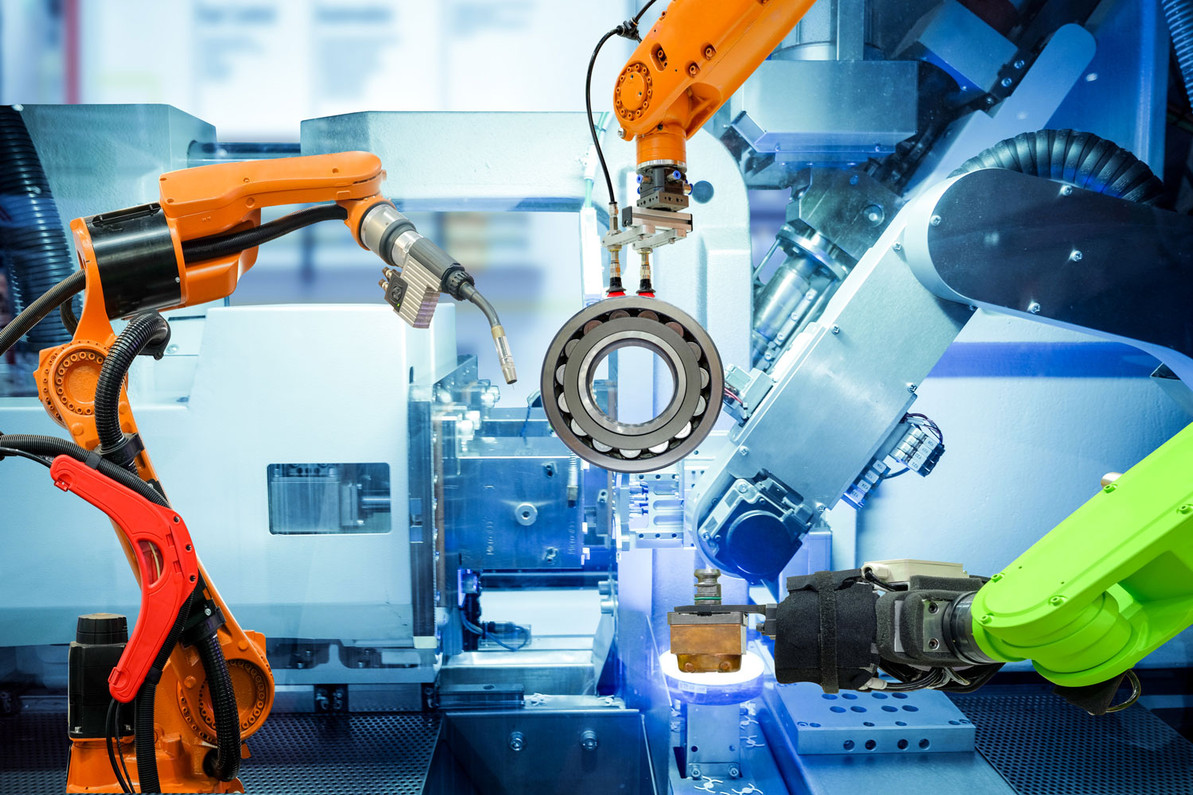The Future of Bearings: Emerging Technologies and Trends
What interesting developments are shaping the future of bearings?
The first ball bearing was patented in 1794 and since then, the bearing industry has continuously evolved in numerous ways. As the world advances technologically, the bearing industry is no different, with new concepts and designs being introduced and used by consumers.
The bearing industry has had to keep pace with modern industrial innovations, with new bearing concepts and designs being introduced to the market and adopted by users. Today, we’re going to explore the fascinating developments that are shaping the future of our bearings and how emerging technologies in the 21st century play a crucial part.
What Are Smart Bearings?
Smart Bearings have developed due to a combination of the latest advancements in bearing technology and the need for users to have more control over their bearing maintenance. The integration of sensors within bearings and IoT technology have revolutionized the way engineers monitor and maintain their bearings within applications, improving efficiency, whilst helping businesses to reduce costs, maximize production and the performance of machines and tools.
The sensors integrated within Smart Bearings allow for the collection and sharing of data on factors like speed, temperature, contamination, and vibration. Though not limited to these factors, all this information is fed to a control unit that is used to monitor the bearing operation. Smart Bearings are used in an array of industrial settings such as agricultural machinery, food processing, robotic control, automotive, printing and more.
What Are The Benefits Of Using Smart Bearings?
One of the main benefits of using Smart Bearings is that they provide real-time data on the performance of the bearing which allows engineers to predict when maintenance is needed. In doing so, this helps them to schedule machine maintenance during times where demand for production is not high.
Predictive maintenance can help lower costs and keep equipment running efficiently and reliably for longer periods of time. The use of smart bearings offers engineers a proactive approach to maintenance which means factories can become more reliable in meeting market demands. Engineers can avoid breakdowns and prevent machine failures more effectively, resulting in fewer machine breakdowns that halt production.
Ensuring proper alignment and stability of machinery is important for the longevity of a bearing and Smart bearings are great for detecting the first signs of abnormal vibration, which can indicate imbalance and misalignment.
Additionally, Smart bearings contain temperature monitoring sensors which can detect overheating problems, commonly caused from excessive friction from within the system or from lack of lubrication. Without the use of smart bearing technology, engineers were more likely to come to these errors after the bearing has failed and production has ceased or when machine failure occurs.
Industry 4.0 The Era of Smart Factories
Industry 4.0, the fourth industrial revolution has introduced smart factories, factories that use advanced technologies such as artificial intelligence (AI) to drive automated processes, analyse data and continuously learn as it goes.
Driven by digital transformation and intelligent automation, the fourth revolution pioneers smart manufacturing within smart factories where the network of machines, communication mechanisms and computing power are interconnected. For decades, in traditional factories, we’ve seen the use of digitised production equipment and automated machines such as barcode scanners and cameras. However, those devices are not interconnected and tend to operate in isolation from data management systems that require regular coordinating and manual processing from engineers.
Smart factories have pioneered the manufacturing, production, and use of Smart Bearings. The need for Smart Bearings has come from the revolution of smart factories and their need for predictive maintenance and control over real-time data and performance statistics. This is just the beginning of how the two are working together to provide engineers data to lower costs and boost productivity to stay ahead of production failures and enhance quality control.

Benefits of Smart Factories
Smart factories can significantly increase automation, productivity, and efficiency to both manufacturing operations and supply chains. Manufacturing in the past has been reactive, however, with the introduction of Smart Factories, plant managers can take a proactive approach to manufacturing products, helping to improve the supply chain management to become more resilient.
Predictive analytics within the Smart Factories can provide accurate forecasts on demand which can help improve the time to bring products to market. Additionally, real-time data and analytics provided by devices and technologies within the factories allow for fast problem solving and decision making and reduce the risk of catastrophic failure of bearings parts and machine processes, speeding up all aspects of the manufacturing process.
Smart Factories offer solutions to aid manufacturers and supply chain managers to reduce risk and operational disruption enabling them to minimalize their reliance on international partners within the market. For manufacturing operations, there has been an urgent priority to increase their resilience and competitiveness within the supply chain.
In becoming fully digital, Smart factories will enable manufacturing operations to be more flexible bringing an agile solution to the manufacturing ecosystem. Smart Factories are fuelling the need for Smart Bearings as the technology within can help Smart Factories achieve resilience within the supply chain.
As mentioned, the benefits of Smart Factories for manufacturers are substantial, however, the consumer can also benefit from these initiatives. Digital advancements like blockchain and RFID sensors are used in Smart Factories to ensure the definitive origin and quality control of all materials and goods at all stages of production, tracing every link in the supply chain.
Companies report up to 12% gains in areas like mfg output, factory utilisation, and labour productivity after investing in SF initiatives (Deloitte 2019 SF study). Having real-time quality control within smart factories enables plant managers to extract data points and relevant statistics at every stage of the manufacturing or production process.
Having increased quality control increases results in businesses producing better quality products which can help lower costs that can be accumulated by product defects and improve a customer’s experiences with products and services offered. Streamlining production and manufacturing within smart factories with the use of parts that contain smart technology like smart bearings can be an added value to the manufacturing process and to the market.
Self-Lubricating Bearings
The future of bearings does not stop here. There are other innovations within the industry which have taken advantage of the latest advancements in bearing technology. Like smart bearings, another emerging trend circulating the industry is the shift to Self-Lubricating Bearings within machinery. In efforts to increase efficiency, self-lubricating bearings are modern devices designed to cater for the growing need for energy efficiency during the manufacturing process. Although this concept is not new, advancements in bearing lubrication technologies have led to the creation of Self-Lubricating Bearings.
As the name indicates, these bearings can operate self-sufficiently without intervention from engineers to provide additional lubrication. In most cases, the bearing housing is fitted with a grease fitting through which an automatic lubricator can feed the system with the right amount of lubrication at the required intervals. Pillow Block Bearings Units, Flanged Bearing Units, and Plummer Block Housing Assemblies are all examples of Self-Lubricating bearings.

What Are The Benefits of Self-Lubricating Bearings?
Self-Lubricating Bearings can reduce maintenance cost and increase control over productivity, improve efficiency and help users adapt a proactive approach to maintenance.
As they gradually eliminate the need for regular maintenance of machinery, this helps reduce the need for repairs and replacement parts which means businesses can reap significant cost savings over the lifespan of the machinery. Industries driving demand for these bearings are predominantly heavy industrial machinery, engineering, aerospace, and defence.
The built-in lubrication can ensure a continuous supply of lubricant to the bearing, helping to reduce friction and wear, aiding machines to operate efficiently and smoothly, further enhancing cost savings for businesses as it reduces energy consumption.
The use of Self-Lubricating Bearings can save businesses time and money on preventive maintenance and donot produceany hazardous waste from the lubricant to be disposed of or cleaned up. Additionally, Self-Lubricating Bearings can help reduce machine downtime as the likelihood of experiencing failures because of inadequate lubrication or contamination being rarer. With the reducing the likelihood of downtime, machinery within factories can operate for longer periods and reduce the probability of unexpected failures.
It is important to remember that Self-Lubricated Bearings are not lubricated for life and only for the period of the bearing’s performance. The requirement for monitoring and maintenance, while minimal, is still present for these bearings. However, the use of Self-Lubricating Bearings gives operators the benefit of longer interludes between maintenance cycles or replacement and therefore limits downtime and allows for more control over shutdown periods.
Overall, as technology advances further the future of bearings will continue to develop. Not only the design of bearings will advance but what is required from their performance within applications within the engineering industry and manufacturing sectors.
The key theme in all these emerging trends is the demand for preventing malfunctions or machine downtime to reduce production costs, maximize production efficiency and output, and adopting predictive maintenance strategies, using smart bearing technology, self-lubricating bearings, and Smart Factories.

Here at Quality Bearings Online, we’ve implemented new technologies and systems in place to help us improve efficiency in our processes, reduce the time it takes for us to carefully pick and pack your parcels before shipment and enhance our ways of working for our team.
To name a few, the integration of our Warehouse Management System, has streamlined our processes in-house, making it easier and quicker us to locate products, improving the efficiency and time taken for us to pick and pack parcels.
Our latest improvement to our processes has replaced the manual process of printing off shipping labels from our couriers and manually inputting our customers details. This has helped our team save time. We have become more efficient, packing more orders, improving the time it takes for customers to receive their shipments and reducing human errors from manually inputting customer data.
We are aware how costly production downtime or machine failure can be to your business, therefore we’re investing in new technologies to reduce the time it takes for us to ship your parcels and to enhance your services with us.
If you would like to find out more about these emerging trends or want to adopt a proactive approach to maintenance, our team is ready to help you. We offer scheduled shipments of the products you need, ensuring you secure the stock in advance, and you get the bearings exactly when you need them and eliminating delays. Contact our knowledgeable team today.
Contact Us
Recent Posts
-
The Best Aviation Greases and Lubricants for Aircraft Repair & Maintenance
Maintaining aircraft reliability and performance requires the use of top-quality aircraft greases an …4th Jul 2025 -
How to Select the Right Engineering Bearings for Your Project
When undertaking any engineering project, selecting the right bearings is crucial to ensuring the pe …10th Jun 2025 -
Where To Buy Kluber Grease & Why It Is High Quality
Kluber Grease is globally renowned for its high-quality lubrication solutions and improving equipmen …20th May 2025
























